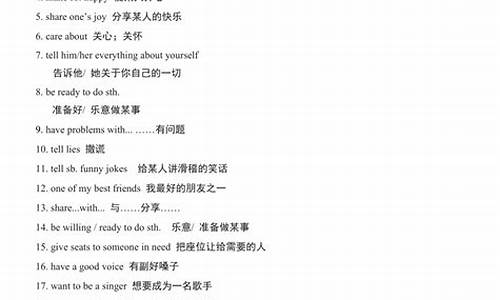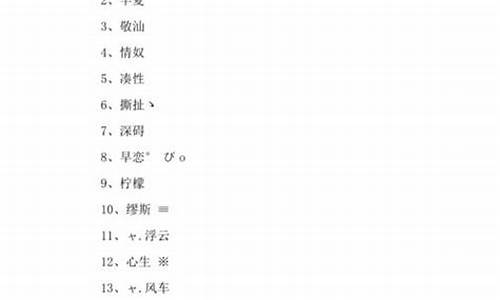您现在的位置是: 首页 > 正能量的句子 正能量的句子
八上英语重点句子主语谓语动词_八年级主谓宾例句100个英语
tamoadmin 2024-09-02 人已围观
简介1.在英语中什么是主语、谓语、宾语、状语、表语、定语、补语、宾补2.英语中的主语,宾语,谓语,状语表语是什么?3.在一个英语句子里,怎样分辨 宾语,状语,谓语,定语,表语等4.找英语高手看看下面句子的主语,谓语,宾语。和主语,谓语动词,宾语。5.八年级上册英语期末复习资料(要详细,有重点语法和考点的的)(如果令我满意我还会加分)Unit 1 How often do you exercis
1.在英语中什么是主语、谓语、宾语、状语、表语、定语、补语、宾补
2.英语中的主语,宾语,谓语,状语表语是什么?
3.在一个英语句子里,怎样分辨 宾语,状语,谓语,定语,表语等
4.找英语高手看看下面句子的主语,谓语,宾语。和主语,谓语动词,宾语。
5.八年级上册英语期末复习资料(要详细,有重点语法和考点的的)(如果令我满意我还会加分)

Unit 1 How often do you exercise?重点语法:频率副词 询问别人做某事的频繁程度 提问用 How often 引导特殊疑问句 回答用 always, sometimes, twice a day 等频率副词。例句:A: How often do you watch TV?(你多长时间看一次电视?) B: I watch TV every day.(我每天都看电视。) A: What's your forite program?(你最喜欢的节目是什么?) B: It's Animal World.(是《动物世界》。) A: How often do you watch it?(你多长时间看一次这个节目?)主要频率副词的等级排序: always(总是) > usually (通常) > often(经常) > sometimes(有时) > hardly ever(很少) > never(从不)隔一段时间做某事数次用 数词 + 时间间隔 的结构构成。如: once a week 一周一次(“一次”用特殊词 once) twice a day 一天两次(“两次”用特殊词 twice) three times a month 一个月三次(三次或三次以上用 基数词 + times 的结构构成) four times a year 一年四次
重点短语:how often 多久一次 as for 至于;关于 how many 多少(针对可数名词) how much 多少(针对不可数名词) of course = sure 当然;确信 look after = take care of = care for 照顾;照看 a lot of = lots of = plenty of 许多;大量 every day 每一天 every night 每晚 hardly ever 几乎不 be good for 对……有益 be good for one's health 有益健康 try to do sth. 尝试做某事 get good grades 取得好成绩 help sb. [to] do sth. 帮助某人做某事 kind of 有点 want [sb.] to do sth. 想要(某人)做某事 keep in good health 保持健康 No two men think alike. 人心各异。
Unit 2 What's the matter?重点语法:询问别人如何感觉 了解人体器官和部位的英文名称 了解一些常见病的英文名称 告诉别人应该怎样做和不应该怎样做例句:A: What's the matter?(怎么了?) B: I'm not feeling well.(我感觉不舒服。)I he a cold.(我感冒了。) A: When did it start?(什么时候开始的?) B: About two days ago.(大约两天前开始的。) A: Oh, that's too bad.(哦,这很糟糕。)You should lie down and rest.(你应该躺下休息。) B: Yes, I think so.(是的,我是这么认为的。) A: I hope you feel better soon.(祝你早日康复。)重点短语: he a cold 患感冒 shouldn't = should not be stressed out 紧张的;有压力的 a few 有些;几个(针对可数名词) a little [bit] 有些;几个(针对不可数名词) at the moment 此刻;现在 What's the matter? = What's wrong? = What's the problem? 怎么了? lie down and rest 躺下休息 see a doctor 看病 hope to do sth. 希望做某事 listen to 听 for example 举个例子 be good for 对……有益 it's + adj. + [for sb.] + to do sth. 做某事(对某人来说)……(加形容词) get tired 感到疲倦 stay healthy 保持健康 give sb. sth. = give sth. to sb. 把某物给某人 need to do sth. 需要做某事
Unit 3 What are you doing for vacation?重点语法:用现在进行时态表示一般将来时态 强调某个动作已经好即将按照去执行例句:A: What are you doing for vacation, Lin Hui?(林辉,放准备干什么呢?) B: I'm going to Tibet for a week.(我要去西藏旅游一周。) A: That sounds interesting!(这听起来很有趣。)What are you doing there?(你去那里准备干些什么事?) B: I'm going hiking in the mountains.(我准备上山徒步旅行。)How about you, Tony?(你呢,托尼?)What are you doing for vacation?(你放准备干些什么呢?) A: I'm visiting my friend in Hong Kong.(我要去拜访我在香港的朋友。) B: Oh yeah?(是吗?)How long are you staying?(你要去多久啊?) A: Just for four days.(只去四天。)I don't like going away for too long.(我不想远走太长时间。) B: Well, he a good time!(祝你旅途愉快!)Send me a postcard from Hong Kong!(记得从香港寄一张明信片回来!) A: Sure. Show me your photos when we get back to school.(当然。当我们再回学校的时候,再看看你的照片。)重点短语:how long 多久 get back = come back 回来 take a vacation = he a vacation 去度 a lot = very much 很;非常 be going to do sth. 将要去做某事 sound + adj. 听起来……(加形容词) sound like + n. 听起来像……(加名词) he a good time = he fun = enjoy oneself 玩得愉快 show sb. sth. = show sth. to sb. 把某物给某人看 want to do sth. = would like to do sth. 想要做某事 plan to do sth. 做某事 spend sometime [in] doing sth. 花时间做某事 need to do sth. 需要做某事 ask sb. about sth. 询问某人某方面的事情 go shopping 去购物 lee for 离开去某地
Unit 4 How do you get to school?重点语法:询问别人做某事的方式 用 How 引导特殊疑问句 其回答有多种方式,其中一种结构是 by doing sth. 或 by sth. 的结构。 询问两地的距离用 how far 引导特殊疑问句 回答用 be + (distance) + [away] + from 的结构。例句:A: How do you get to school?(你如何去上学?) B: I take the subway.(我乘地铁去上学。) A: How far is it from your home to school?(从家到学校多远?) B: It's three miles.(有三英里远。) A: How long does it take you to get from home to school?(从家到学校需要花多长时间?) B: It takes 25 minutes.(要花 25 分钟。)重点短语:by bus = take the bus 乘公共汽车 how far 多远 depend on 依赖于 by boat = take the boat 乘船 look at 看 by train = take the train 乘火车 by bike = ride one's bike 骑车 by subway =take the subway 乘地铁 by plane = take the plane 乘飞机 on foot 走路 get up 起床 he breakfast 吃早饭 lee for somewhere 离开去某地 take sb. to somewhere 带某人去某地 half an hour = thirty minutes 半小时(三十分钟) around the world = all over the world 全世界 get to school 到学校 think of 认为 on weekend 在周末
Unit 5 Can you come to my party?重点语法:询问并请求某人做某事例句:A: Hey, De.(你好,戴夫。)Can you go to the movies on Saturday?(周六你能去看**吗?) B: I'm sorry, I can't.(对不起,我不能去。)I he too much homework this weekend.(这个周末我有太多作业要做。) A: That's too bad.(这太糟了。)Maybe another time.(只好等下一次了。) B: Sure, Joe.(当然,乔。)Thanks for asking.(谢谢你的邀请。)重点短语:the day after tomorrow 后天 the day before yesterday 前天 come over 来访 study for a test 复习迎考 go to the doctor = see the doctor 看病 he to 不得不;必须(强调客观上) must 不得不;必须(强调主观上) help sb. with sth. = help sb. [to] do sth. 帮助某人做某事 too much + n. 太多(针对不可数名词) too many + n. 太多(针对可数名词) much too + adj. 太……(加形容词) go to the movies 看** practice doing sth. 练习做某事 thanks for [doing] sth. 为(做)某事而感谢 go to the dentist 看牙医 be going to do sth. 将要做某事(该事已好) will do sth. 将要做某事(该事尚未) keep quiet 保持安静
Unit 6 I'm more outgoing than my sister.重点语法:在两件或多件事物中进行比较 使用形容词的比较级和最高级 通常形容词的比较级是在形容词后加 -er(以e结尾的单词直接加r,闭音节辅音字母结尾双写辅音字母加-er)的结构构成,最高级是在形容词前加 the ,形容词后加 -est(以e结尾的单词直接加st,闭音节辅音字母结尾双写辅音字母加-est)的结构构成。(eg/ big → bigger → the biggest 形容词 big 的原级、比较级和最高级;small → smaller → the smallest 形容词 small 的原级、比较级和最高级) 当一个单词有3个或以上音节时,其比较级是在形容词前加 more 的结构,其最高级是在形容词前加 the most 的结构构成。(eg/ expensive → more expensive → the most expensive 形容词 expensive 的原级、比较级和最高级;outgoing → more outgoing → the most outgoing 形容词 outgoing 的原级、比较级和最高级)例句:A: Lin Ping is my friend. (Lin Ping 是我的朋友。)She's a little more outgoing than me.(她比我性格要活泼开朗一些。) B: My friend is the same as me.(我的朋友跟我一样。)We are both quiet.(我们都很静。) A: Do you look the same?(你们长相相像吗?) B: No, I'm a little taller than her.(不,我比她高一点。)重点短语:more than 超出…… in common 共同的 be good at = do well in 在某方面做得好 most of 大多数 in some ways 在某些方面 the same as 与……一样 make sb. + adj. 让某人(感觉)……(加形容词) stop doing sth. 停止做某事 stop to do sth. 停止当前做的事去做另一件事 begin with 以……开始 each other 互相 enjoy oneself = he fun = he a good time 玩得高兴 spend sometime [in] doing sth. = spend sometime on sth. 花时间做某事 plan to do sth. 做某事 on a farm 在农场
Unit 7 How do you make a banana milk shake?重点语法:描述一个过程 服从别人的指令 询问做某事的过程用 how 引导特殊疑问句 分步回答用 first(首先), next(接着), then(然后), finally(最后) 等时间副词引导从句。例句:A: How do you make fruit salad?(如何做水果沙拉?) B: First cut up three bananas, three les and a watermelon.(首先切三个香蕉、三个苹果和一个西瓜。)Next put the fruit in a bowl.(接下来把水果放到一个碗里。)Then put in two teaspoons of honey and a cup of yogurt.(然后放入两勺蜂蜜和一杯酸奶。) Finally mix it all up.(最后将它们放在一起搅拌。)重点短语:turn on 打开(电器)[闭合开关] turn off 关闭(电器)[断开开关] cut up 切碎 mix up 混合 add ... to ... 把……加到……上 pour ... into ... 把……浇到……里面 put ... in ... 把……放到……里面 put ... on ... 把……放到……上面 a cup of 一杯 a teaspoon of 一勺
Unit 8 How was your school trip?重点语法:一般过去时态结构:主语 + 谓语动词的过去式 + 宾语 谈论过去发生的事情用一般过去时态 do/does 的一般过去时态形式:did例句:Last week I visited my aunt's house.(上个星期我去我姑姑家玩了。)She lives in California.(她住在加利福尼亚州。)The weather was beautiful.(那儿的天气很好。)I went swimming.(我去游泳了。)重点短语:hang out 闲逛 sleep late 睡过头 take photos = take pictures 照相 he a great time = he fun = enjoy oneself 玩得高兴 at the end of 在……的尽头 the class monitor 班长 a day off 一整天 go for a drive 开车兜风 he fun doing sth. 做某事很愉快 a bowl of 一碗 help sb. [to] do sth. 帮助某人做某事一些不规则动词的原形和过去式:hang → hung buy → bought sleep → slept read/ri:d/ → read/red/
Unit 9 When was he born?重点语法:一般过去时态 谈论著名人物例句:A: How long did Charles Smith hiccup?(查理斯·史密斯打嗝了多长时间?) B: He hiccupped for 69 years and 5 months.(他打嗝了 69 年零 5 个月。) A: When did he start hiccupping?(他什么时候开始打嗝的?) B: He started in 1922.(他从 1922 年就开始打嗝了。) A: When did he stop hiccupping?(他什么时候停止打嗝的?) B: He stopped in 1990.(他到 1990 年才停止打嗝。)重点短语:too ... to ... 太……以致不能…… take part in = join 参加 because of 因为…… major in 主修;专研 start doing sth. 开始做某事(该事已好) start to do sth. 开始做某事(该事尚未) spend sometime with sb. 花时间和某人在一起 spend sometime [in] doing sth. = spend sometime on sth. 花时间做某事 see sb. do sth. 看见某人做某事(强调全局) see sb. doing sth. 看见某人做某事(强调偶然性)
Unit 10 I'm going to be a basketball player.重点语法:一般将来时态 do/does 的两种一般将来时态形式:will do;be going to do 两种形式的区别:will do 强调事情尚未好而即将做 be going to do 强调事情已好并将按照来做 本单元重点强调 be going to do 的形式。例句:A: What are you going to do next year?(明年你准备干些什么?) B: Well, I'm going to take guitar lessons.(我明年要上吉他音乐课。)I really love music.(我很喜欢音乐。) A: Sounds interesting.(听起来很有趣。)I'm going to learn a foreign language.(我明年要学一门外语。)重点短语:grow up 成长;长大 at the same time 同时 all over 遍及 all over the world = around the world 全世界 be going to do sth. 将要做某事 practice doing sth. 练习做某事 study hard 努力学习 take lessons 上课 sound + adj. 听起来……(加形容词) sound like + n. 听起来像……(加名词) se money 存钱 buy sb. sth. = by sth. for sb. 给某人买某物 buy sth. with the money 用钱买某物 write articles 写文章 learn to do sth. 学习做某事 get good grades 取得好成绩 play sports 运动 keep fit 保持健康 write to sb. 给某人写信 enjoy doing sth. 享受做某事
Unit 11 Could you please clean your room?重点语法:委婉请求别人做某事 引导词用 can, shall, will 等情态动词的过去时态例句:A: Could I please use your computer?(我能用一下你的电脑吗?) B: Sorry. I'm going to work on it now.(对不起,我正在忙着用电脑。) A: Well, could I watch TV?(那么,我能看电视吗?) B: Yes, you can.(是,你可以看电视。)But you he to clean your room.(但是是在你打扫完房间之后。)重点短语:do the dishes = wash the dishes 洗碗 take out 取出 make one's bed 整理床铺 work on 从事;忙于 do chores = do housework 干家务 do the laundry = wash the clothes 洗衣服 take care of = care for = look after 照看;照顾 sweep the floor 扫地 fold one's clothes 叠衣服 go to the movies 看** get a ride 骑车 go to a meeting 开会 hate (to do/doing) sth. 讨厌做某事 like (to do/doing) sth. 喜欢做某事 invite sb. to somewhere 邀请某人去某地 go to the store = go shopping 购物 forget to do sth. 忘记做某事(该事尚未做) forget doing sth. 忘记做某事(该事已做过) give sb. sth. = give sth. to sb. 把某物给某人 buy sb. sth. = buy sth. for sb. 买某物给某人 on vacation 度
Unit 12 What's the best radio station?重点语法:在各事物间进行比较 用形容词的原形、比较级和最高级例句:A: Hello! I'm a reporter.(你好,我是记者。)Can I ask you some questions?(我能问你一些问题吗?) B: Sure.(当然可以。) A: What's the best clothing store in town?(城里最好的服装店是哪一家?) B: I think Jason's is the best.(我认为杰森服装店是最好的。) A: Why do you think so?(为什么这样认为呢?) B: Jason's has the best quality clothes.(杰森服装店有质量最好的服装。)重点短语:close to = near 靠近;接近 inexpensive = cheap 便宜的 clothing store 服装店 radio station 广播站 talent show 业余歌手演唱会 it is adj. [for sb.] to do sth. 做某事(对某人来说)感觉……(加形容词) cut the price 打折 not ... at all = not ... in the slightest 一点也不 in fact 实际上 pay for 为……而付款 sth. cost sb. (money) 某人花钱买了某物 good/well → better → the best 形容词 good /副词 well 的原级、比较级和最高级 bad/badly → worse → the worst 形容词 bad /副词 badly 的原级、比较级和最高级
在英语中什么是主语、谓语、宾语、状语、表语、定语、补语、宾补
具体结构如下:
英语句子的基本结构是主语+谓语+宾语,其中主语是句子中的主要名称或代词,谓语是描述主语动作或状态的动词,而宾语则是动作的对象。但是英语句子还可以包括其他成分,如形容词、副词、介词短语、从句等。这些成分的组合形式可以丰富句子的表达效果。
例如:
主语+谓语:I?love?you.(我爱你。)
-?主语+谓语+宾语:They?eat?pizza.(他们吃披萨。)
-?主语+谓语+间接宾语+直接宾语:My?mother?ge?me?a?book.(我妈妈给了我一本书。)
-?主语+谓语+宾语+宾语补足语:He?painted?the?house?white.(他把房子刷成了白色。)
-?主语+谓语+主语补足语:She?felt?hy.(她感到幸福。)
-?主语+谓语+宾语+宾语补足语+副词修饰语:The?teacher?made?the?students?study?hard?in?class?yesterday.(昨天老师让学生们在班上努力学习了。)
英语中的主语,宾语,谓语,状语表语是什么?
1、主语(subject)是句子叙述的主体,一般置于句首,可由名词、代词、数词、名词化的形容词、不定式、动名词和主语从句等来承担。
2、谓语(predicate)说明主语所发出的动作或具有的特征或状态,一般由动词来承担。谓语是对主语动作或状态的陈述或说明,指出“做什么”和“是什么”或“怎么样”,谓语动词的位置一般在主语之后。
3、宾语(object),又称受词,是指一个动作(动词)的对象或接受者,常位于及物动词或介词后面。宾语分为直接宾语和间接宾语(间接宾语也称宾语补足语)两大类,其中直接宾语指动作的直接对象,间接宾语说明动作的非直接,但受动作影响。
4、定语(Attributive)是用来修饰、限定、说明名词或代词的品质与特征的成分。定语主要有形容词此外还有名词、代词、数词、介词短语、动词不定式(短语)、分词、定语从句或相当于形容词的词、短语或句子。
5、状语,英语中,修饰动词、形容词、副词等的句子成分叫状语(adverbial)。状语的功用:说明地点、时间、原因、目的、结果、条件、方向、程度、方式和伴随状况等。状语一般由副词、介词短语、分词和分词短语、不定式或相当于副词的词或短语来担当。其位置一般放在句末,但也可放在句首或句中。
6、英语补语(Complement)的作用对象是主语和宾语,具有鲜明的定语性描写或限制性功能,在句法上是不可或缺的,是起补充说明作用的成分。最常见的是宾语补足语。名词、动名词、形容词、副词、不定式、现在分词、过去分词都可以在句子中作补语。
7、表语(predicative)是用来说明主语的身份、性质、品性、特征和状态的,表语常由名词、形容词、副词、介词短语、不定式、动词的-ing、从句来充当,它常位于系动词之后。如果句子的表语也是由一个句子充当的,那么这个充当表语的句子就叫做表语从句。
8、宾语补足语指在英语中有些及物动词,接了宾语意义仍不完整,还需要有一个其他的句子成分,来补充说明宾语的意义、状态等,简称宾补。宾语和它的补足语构成复合宾语。而复合宾语的第一部分通常由名词或代词充当,第二部分表示第一部分的名词或代词发出的动作或身份、特征等,称为宾语补足语。
扩展资料:
基本形式:简单句的基本形式是由一个主语加一个谓语构成。其它各种句子形式都是由此句型发展而来,如五大基本句型:
1、主语+谓语(s.+predicate),这种句型简称为主谓结构,其谓语一般都是不及物动词。
2、主语+系动词+表语(s.+link v.+predicative),这种句型称为主系表结构,其实联系动词在形式上也是一种谓语动词,系动词与表语一起构成了复合谓语。
3、主语+谓语+间接宾语+直接宾语(s.+predicate+oi.+od.),这种句型可称为主谓宾宾结构,其谓语应是可有双宾语的及物动词,两个宾语一个是间接宾语,一个是直接宾语。
4、主语+谓语+宾语+宾语补足语(s.+predicate+o.+o.c.),这种句型可简称为主谓宾补结构,其补语是宾语补语,与宾语一起即构成复合宾语。
5、主语+谓语+宾语(s.+predicate+o.),这种句型可称为主谓宾结构,它的谓语一般多是及物动词。
参考资料:
百度百科--英语语法
在一个英语句子里,怎样分辨 宾语,状语,谓语,定语,表语等
组成句子的各个部分叫句子成分。
英语句子成分有主语,谓语,表语,宾语,宾语补足语,定语,状语等。
顺序一般是主语,谓语,宾语,宾语补足语,而表语,定语,状语的位置要根据情况而定。
1、主语
主语表示句子主要说明的人或事物,一般由名词,代词,数词,不定式等充当。
He likes watching TV. 他喜欢看电视。
2、谓语
谓语说明主语的动作,状态或特征。
一般可分为两类:
1),简单谓语
由动词(或短语动词)构成。
可以有不同的时态,语态和语气。
We study for the people. 我们为人民学习。
2),复合谓语:情态动词+不定式
I can speak a little English. 我可以说一点英语。
3、表语
表语是谓语的一部分,它位于系动词如be之后,说明主语身份,特征,属性或状态。一般由名词,代词,形容词,副词,不定式,介词短语等充当。
My sister is a nurse.我姐姐是护士。
4、宾语
宾语表示动作行为的对象,跟在及物动词之后,能作宾语的有名词,代词,数词,动词不定式等。
We like English. 我们喜欢英语。
有些及物动词可以带两个宾语,往往一个指人,一个指物,指人的叫间接宾语,指物的叫直接宾语。
He ge me some ink.他给了我一点墨水。
有些及物动词的宾语后面还需要有一个补足语,意思才完整,宾语和它的补足语构成复合宾语。如:
We make him our monitor.我们选他当班长。
5、定语
在句中修饰名词或代词的成分叫定语。
用作定语的主要是形容词,代词,数词,名词,副词,动词不定式,介词短语等。形容词,代词,数词,名词等作定语时,通常放在被修饰的词前面。
He is a new student.他是个新生。
但副词,动词不定式,介词短语等作定语时,则放在被修饰的词之后。
The bike in the room is mine.房间里的自行车是我的。
6、状语
修饰动词,形容词,副词以及全句的句子成分,叫做状语。用作状语的通常是副词,介词短语,不定式和从句等。状语一般放在被修饰的词之后或放在句尾。副词作状语时可放在被修饰的词前或句首。
He lives in London.他住在伦敦。
找英语高手看看下面句子的主语,谓语,宾语。和主语,谓语动词,宾语。
1、主语
主语(subject)是句子叙述的主体,一般置于句首,可由名词、代词、数词、名词化的形容词、不定式、动名词和主语从句等来承担。
主语是句子陈述的对象,说明是谁或是什么。表示句子说的是"什么人"、“什么事”、“什么东西”、“什么地方”等等。
例如:
The plane has just taken off at the airport. 飞机刚从机场起飞。
I respect his privacy. 我尊重他的隐私权。
两句中“the plane”和”I"做主语。
2、谓语
谓语(predicate)说明主语所发出的动作或具有的特征或状态,一般由动词来承担。谓语是对主语动作或状态的陈述或说明,指出“做什么”和“是什么”或“怎么样”,谓语动词的位置一般在主语之后。
3、宾语
宾语(object),又称受词,是指一个动作(动词)的对象或接受者,常位于及物动词或介词后面。宾语分为直接宾语和间接宾语(间接宾语也称宾语补足语)两大类,其中直接宾语指动作的直接对象,间接宾语说明动作的非直接,但受动作影响。
一般而言,及物动词后面最少要有一个宾语,而该宾语通常为直接宾语,有些及物动词要求两个宾语,则这两个宾语通常一个为直接宾语,另一个为间接宾语。名词、代词、数词、动名词、to do不定式、一个句子都可以做宾语,而to do不定式用于宾语补足语。
4、定语
定语(Attributive)是用来修饰、限定、说明名词或代词的品质与特征的成分。定语主要有形容词此外还有名词、代词、数词、介词短语、动词不定式(短语)、分词、定语从句或相当于形容词的词、短语或句子。
汉语中常用‘……的’表示。定语和中心语之间是修饰和被修饰、限制和被限制的关系。在汉语中,中心语与定语二者之间有的需要用结构助词“的”,有的不需要,有的可要可不要。“的”是定语的标志。
5、状语
英语中,修饰动词、形容词、副词等的句子成分叫状语(adverbial)。
状语的功用:说明地点、时间、原因、目的、结果、条件、方向、程度、方式和伴随状况等。
状语一般由副词、介词短语、分词和分词短语、不定式或相当于副词的词或短语来担当。其位置一般放在句末,但也可放在句首或句中。
6、补语
英语补语(Complement)的作用对象是主语和宾语,具有鲜明的定语性描写或限制性功能,在句法上是不可或缺的,是起补充说明作用的成分。最常见的是宾语补足语。名词、动名词、形容词、副词、不定式、现在分词、过去分词都可以在句子中作补语。
7、表语
表语(predicative)是用来说明主语的身份、性质、品性、特征和状态的,表语常由名词、形容词、副词、介词短语、不定式、动词的-ing、从句来充当,它常位于系动词(be, become, ear, seem, look ,sound, feel, get, smell等词)之后。
如果句子的表语也是由一个句子充当的,那么这个充当表语的句子就叫做表语从句。
8、同位语
同位语(ositive)是当两个指同一事物的句子成分放在同等位置时,一个句子成分可被用来说明或解释另一个句子成分,前者就叫做后者的同位语.这两个句子成分多由名词(代词)担任,同位语通常皆放在其说明的名词(代词)之后。同位语和补语的区别在于:补语不能缺少,同位语可以缺少。
9、独立成分
独立成分(independent element)是当一个词、短语或从句用在句子里面,与句子的其他成分只有意义上的联系而没有语法关系时,它就称为独立成分。常见的独立成份有呼吁、惊叹语、答语、插入语、介词短语、非谓语动词所构成的短语及形容词、副词所引起的词组等。
扩展资料:
句子成分顺口溜:
主谓宾,定状补,主干枝叶分清楚。
主干成分主谓宾,枝叶成分定状补。
定语必居主宾前,谓前为状谓后补。
状语有时位主前,逗号分开心有数。
基本成分主谓宾,连带成分定状补。
六者关系难分辨,心中有数析正误。
什么谁称主,做是怎样才充谓;
宾语动支配,回答谓语什么谁。
前置状语目(的)时(间)地(点),意义不变能复位。
补语从后说前谓,定语才和后宾配。
介宾短语多状补,不能充当宾主谓。
的定地状与得补,语言标志定是非。
百度百科-英语语法
百度百科-句子成分
八年级上册英语期末复习资料(要详细,有重点语法和考点的的)(如果令我满意我还会加分)
He often eats eggs for breakfast
主语He,谓语eat,宾语egg
Please show me your book
这是祈使句,没有主语,而且一般不用考虑这个主谓宾的。
The children call me aunt
主语the children,谓语call,宾语me,宾补aunt。
1、词类:英语词类分十种:
名词、形容词、代词、数词、冠词、动词、副词、介词、连词、感叹词。
1、名词(n.): 表示人、事物、地点或抽象概念的名称。如:boy, morning, bag, ball, class, orange.
2、代词(pron.): 主要用来代替名词。如:who, she, you, it .
3、形容词(adj..):表示人或事物的性质或特征。如:good, right, white, orange .
4、数词(num.): 表示数目或事物的顺序。如:one, two, three, first, second, third, fourth.
5、动词(v.): 表示动作或状态。如:am, is,are,he,see .
6、副词(adv.): 修饰动词、形容词或其他副词,说明时间、地点、程度等。如:now, very, here, often, quietly, slowly.
7、冠词(art..):用在名词前,帮助说明名词。如:a, an, the.
8、介词(prep.): 表示它后面的名词或代词与其他句子成分的关系。如in, on, from, above, behind.
9、连词(conj.): 用来连接词、短语或句子。如and, but, before .
10、感叹词(interj..)表示喜、怒、哀、乐等感情。如:oh, well, hi, hello.
2、句子成分:英语句子成分分为七种:主语、谓语、宾语、定语、状语、表语、宾语补足语。
1、主语是句子所要说的人或事物,回答是“谁”或者“什么”。通常用名词或代词担任。如:I’m Miss Green.(我是格林**)
2、谓语动词说明主语的动作或状态,回答“做(什么)”。主要由动词担任。如:Jack cleans the room every day. (杰克每天打扫房间)
3、表语在系动词之后,说明主语的身份或特征,回答是“什么”或者“怎么样”。通常由名词、代词或形容词担任。如:My name is Ping ping .(我的名字叫萍萍)
4、宾语表示及物动词的对象或结果,回答做的是“什么”。通常由名词或代词担任。如:He can spell the word.(他能拼这个词)
有些及物动词带有两个宾语,一个指物,一个指人。指物的叫直接宾语,指人的叫间接宾语。间接宾语一般放在直接宾语的前面。如:He wrote me a letter . (他给我写了一封信)
有时可把介词to或for加在间接宾语前构成短语,放在直接宾语后面,来强调间接宾语。如:He wrote a letter to me . (他给我写了一封信)
5、定语修饰名词或代词,通常由形容词、代词、数词等担任。如:
Shanghai is a big city .(上海是个大城市)
6、状语用来修饰动词、形容词、副词,通常由副词担任。如:He works hard .(他工作努力)
7、宾语补足语用来说明宾语怎么样或干什么,通常由形容词或动词充当。如:They usually keep their classroom clean.(他们通常让教室保持清洁) / He often helps me do my lessons.(他常常帮我做功课) / The teacher wanted me to learn French all by myself.(老师要我自学法语)
☆同位语通常紧跟在名词、代词后面,进一步说明它的情况。如:Where is your classmate Tom ?(你的同学汤姆在哪里?)
3、构词法:英语构词法主要有:合成法、派生法和转换法。
1、合成法:如:spaceship, headache, basketball, playground等等。
2、派生法:
(1)派生名词:①动词+er/or ②动词+ing ③动词+(t)ion ④形容词+ness ⑤其他,如:inventor, learner, swimming, congratulation, kindness, carelessness, knowledge
(2)派生形容词:①名词+y ②名词+ful ③动词+ing/ed ④friendly ⑤dangerous ⑥Chinese; Japanese ⑦English ⑧French ⑨German ⑩国名+(i)an 如:snowy, sunny, hopeful, beautiful, interesting, follwing, daily(每日的),nervous, delicious
(3)派生副词:①形容词+ly ②其它,如:slowly, angrily, full→fully, good→well, possible→possibly等等。
3、转换法:
(1)形容词→动词,如:dry(干燥的)→dry(弄干), clean(干净的)→clean(打扫,弄干净),等等。
(2)动词→名词,如:look, walk, rest, work, study, swim, go, talk等等。
(3)名词→动词,如:hand(手)→(传递),face(脸)→(面对)等等。
(4)形容词→副词,如:early→early, fast→fast等等。
(5)副词→连词,如:when(什么时候)→(当……时候),等等。
(6)介词→副词,如:in(到……里)→(在里面;在家),on(在…上)→(进行,继续)。
我有一些习题,自己找的
1.我建议这周末去野营,但是大部分同学不赞成。
I _______________________ this weekend,but _____________ the classmates don't agree.
2.你洗盘子时不要让水一直流淌。
Don't ______________ while you wash dishes.
3.Benny asked Daisy,“Who were you talking to?”
Benny asked Daisy who ________ _______ _____ ______?
4.“Turn that tap off.”a voice said angrily.
“Turn that tap off.”a voice _______ _______.
5.汤姆提议去海滩,但我们大多数人不同意他的建议。
Tom ________ _________ to the beach, but ______ ____ us didn't _____ _______ him.
6.你们决定为我们班做点什么事情?
What did you __________ _______ _________forour class?
7.Remember not to waste or pollute me.
________ ________ to waste or pollute me.
8.It is necessary for us to put on the picture now.
______ ______ _______ the picture now is necessary for us.
答案:
1 suggest going camping, most of
2 let the water flow all the time
3 you were talking to
4 shout angrily
5 suggest going, most of, agree with
6 decide to do
7 Don't forget
8 To put on
一、词汇
(一)按要求完成各题。
1.mean(名词)_______________ 2.hey(比较级)________________
3.slowly(最高级)___________ 4.lee(现在分词)______________
5.wish(复数)________________
(二)用所给词的适当形式填空。
1.September is the_____________(nine) of month of the year.
2.Usually, he___________(catch)the No.11 bus to work. Now he is getting on the bus.
3.I'm stronger than he, but he is much_____________(good)than I at skating.
4.He is the_______________(short)man on the team, but he is the _____________(fast).
二、选择填空
( ) 1.In English, the last name is the__________.
A.given name B.family name C.middle name D.full name
( ) 2.What do you call James________short.
A.for B.to C.about D.of
( ) 3.Tom likes_________football game very much.
A.to see B.to look C.watching D.looking at
( ) 4.My father and I________see Aunt Alice next Saturday.
A.am going to B.are going to C.goes to D.go to
( ) 5.Let's walk to the shop. It______near.
A.quite B.is quite C.too D.is too
( ) 6.You're going to help the farmers_________.
A.pick les B.picking le C.pick le D.picking le
( ) 7.A big truck always carries________than a small one.
A.many B.much C.more D.most
( ) 8.Is Lily the________girl_______her class?
A.tallest;of B.tallest;in C.taller;in D.taller;of
( ) 9.Why_______do your homework first?
A.don't you B.not you C.are you D.do you
( )10.The boy is eating_________.
A.the time B.all the time C.all time D.sometimes
( )11.Let's talk about the difference____English names and
Chinese names.
A.of B.between C.for D.from
( )12.She must get up early______next morning.
A.in B./ C.on D.at
( )13.—What's your sister like?
—__________.
A.She likes all kinds of things.
B.She likes all of us.
C.She is tall.
D.She's very well. Thanks.
( )14.—What time shall we meet?
—Let's make it_______nine o'clock.
A.at B.on C.for D./
( )15.Listen! Can you hear him_______in the next room.
A.sings B.is singing C.to sing D.singing
三、按要求改写句子。
1.Jim is going to take a bus to work.(用 every day 改写)
Jim____________a bus to work every day.
2.I'd like to come, too.(改为一般疑问,并作肯定回答)
_________ ________like to come, too? I'd love to.
3.He needs a number 12 bus. (就划线部分提问)
__________bus_____________he____________
4.The Young Pioneers are going to he a picnic next Sunday.
(划线提问)
_______ ______the Young Pioneers_____ ______ _______next Sunday?
5.It's better for you to wear warm clothes. (改为同义句)
You________ ________ ______ warm clothes.
6.better, which, like, do, you, cats, dogs, or?(连词成句)
________ do you like______, cats or dogs?
四、完成句子。
1.我不能及时到校,因为交通很糟。
I can't get to school_____ ______because the traffic is bad.
2.快点!我想走快些。
________ ________! I want to go faster.
3.孩子们喜欢在户外玩。
Children love to play_________ _________ ________ ________.
4.我不能同意你的意见。
I can't____________ __________you.
5.彼得在离他家十公里的城镇工作。
Peter works in a_________about ten________ ________his home.
6.高老师正站在黑板前面。
Miss Gao is________ ________ ________ ________the blackboard.
答案:
一、(一)1.meaning 2.heier 3.most slowly 4.leing 5.wishes
(二)1.ninth 2.catches 3.better 4.shortest...fastest
二、B A C B B A C B A B B B C D D
三、1.takes 2. would you 3.Which...does...need?
4.What are...going to do 5.had better wear 6. Which...better
四、1.on time 2.Hurry up 3.in the open air 4.agree with
5.town...kilometres from 6.standing in front of . 还有N多,在我给你的参考网站里;://zhidao.baidu/question/79650137.html?si=5
上一篇:优秀的座右铭_优质座右铭大全
下一篇:描述心累的句子唯美_心累的形容









